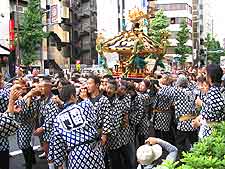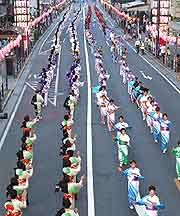Tokyo Life and Visitor Travel Tips
(Tokyo, Kanto, Honshu, Japan)

Tokyo is the epitome of Japanese life, a city full of modern high-rise buildings and glitzy offices blocks, contrasting dramatically with Tokyo's many historical palaces, Buddhist temples and large landscaped parklands. When people plan a visit to Japan, Tokyo is often the top of their list and its overall size should not be off-putting, since the city's superb network of underground subway trains makes most areas both easy and cheap to reach and travel around. However, local life in Tokyo can certainly be a little chaotic at times, especially during the daily rush hours.
Tourists staying in Tokyo will easily be able to stay abreast of the world's latest news, since English-language information is readily available all around the city. The Asahi Shimbun, Daily Yomiuri, Mainichi Daily News and the Japan Times are all extremely popular English-language newspapers and available around the city, while both the Tokyo Journal and free weekly Metropolis magazine are full of cultural listings. Here are some top travel tips about life in Tokyo.

Useful Contact Details
Several good tourist offices are available around Tokyo and are operated by the Japan National Tourist Organisation (JNTO). On the first floor of Narita Airport's Terminal 2 you will find a used branch, manned by English-speaking staff. A further JNTO centre is located in the heart of central Tokyo and can be found on the 10th floor of the Kotsu Kaikan Building in the Yuraku-cho area.
This particular offering is especially comprehensive and the best place to visit for most information about the city and travelling around Japan, and is just outside of the Yuraku-cho Station. Tokyo's tourist information centres will always be happy to find you available rooms at hotels or ryokan inns. However, only members of the well-known Welcome Inn group are used.
Also of interest to visitors staying in the city, the Tokyo TIC operates a 24-hour taped service where all the latest events are listed (tel: +81 03 3201 2911), while the Asakusa TIC actually offers free-guided tours around the district every Sunday afternoon.
Narita Airport (NRT) Tourist Information Centre (TIC)
Address: Terminal 2, Narita-shi, Chiba, 282-8601, Japan, JP
Tel: +81 0476 322 802
Open hours: daily - 09:00 to 20:00
Tokyo Tourist Information Centre (TIC)
Address: 2-10-1 Yuraku-cho, Chi-yoda-ku, Tokyo, Japan, JP
Tel: +81 03 3216 1901
Open hours: Monday to Friday - 09:00 to 17:00, Saturday - 09:00 to 12:00
Asakusa Tourist Information Centre (TIC)
Address: 4-5-6 Higashi-Ueno, Taito-ku, Tokyo, Japan, JP
Tel: +81 03 5246 1151
Open hours: daily - 10:00 to 17:00, guided tours on Sunday - 13:30 and 15:00
Information Bureau of Tokyo
Address: Ground Floor, Tokyo Station, close to the Yaesu exit, Tokyo, Japan, JP
Open hours: Monday to Saturday - 09:00 to 18:00
Tokyo Convention and Visitors Bureau (TCVB)
Address: 1st Floor, Tokyo Chamber of Commerce and Industry Building, 3-2-2 Marunouchi, Chiyoda-ku, Tokyo, Japan, JP
Tel: +81 03 3287 7024
Open hours: Monday to Friday - 10:00 to 17:00, Saturday and Sunday - 10:00 to 16:00
Language and Dialect
When visiting Tokyo, bring a phrasebook - you will find that it will aid your communication greatly and the locals will always appreciate your efforts. Start all conversations with a smile to create a relaxed atmosphere and always speak slowly and carefully. If you find speaking Japanese phrases a little more than you can manage, surprisingly the locals often understand written English words easier than when spoken. Useful Japanese phrases to use in Tokyo are as follows:
Good morning - o-hayou gozaimasu
Hello / Good afternoon - konnichiwa
Excuse me / I'm sorry - gomennasai
Good evening - konban wa
Thank you - domo arigatou
Goodbye - sayonara
Currency
The Japanese Yen is the currency used in Tokyo and throughout the country, with both coins and notes of various amounts. The coins are as follows, with the 5-yen and 50-yen coins featuring small holes through the centres.
- Y1 (aluminium)
- Y5 (brass)
- Y10 (bronze)
- Y50 (cupro-nickel)
- Y100 (cupro-nickel)
- Y500 (cupro-nickel)
Banks notes come in the following denominations: 1,000, 2,000, 5,000 and 10,000 yen. Travellers cheques are accepted by all of Tokyo's main banks, hotels and shopping centres.
 Tokyo is the epitome of Japanese life, a city full of modern high-rise buildings and glitzy offices blocks, contrasting dramatically with Tokyo's many historical palaces, Buddhist temples and large landscaped parklands. When people plan a visit to Japan, Tokyo is often the top of their list and its overall size should not be off-putting, since the city's superb network of underground subway trains makes most areas both easy and cheap to reach and travel around. However, local life in Tokyo can certainly be a little chaotic at times, especially during the daily rush hours.
Tokyo is the epitome of Japanese life, a city full of modern high-rise buildings and glitzy offices blocks, contrasting dramatically with Tokyo's many historical palaces, Buddhist temples and large landscaped parklands. When people plan a visit to Japan, Tokyo is often the top of their list and its overall size should not be off-putting, since the city's superb network of underground subway trains makes most areas both easy and cheap to reach and travel around. However, local life in Tokyo can certainly be a little chaotic at times, especially during the daily rush hours.